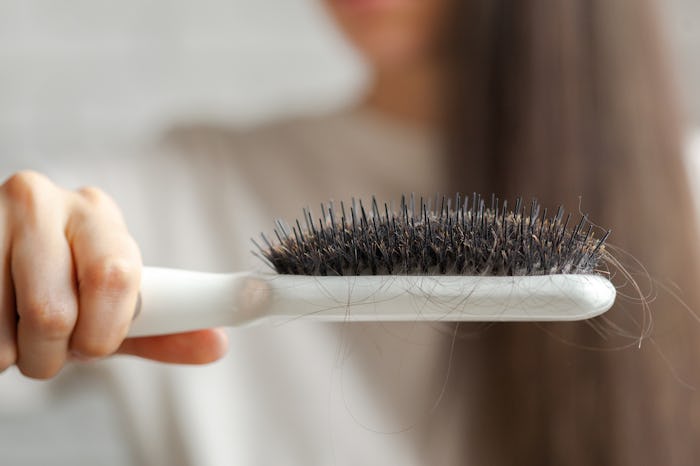Life
8 Physical Signs Your Body Is Producing Too Much Estrogen & Why That Matters
Estrogen and other hormones facilitate processes and do other things in your body that are important, but imbalances can seriously throw things out of whack. And when that happens, there can be some physical signs that things might not be going as they should. There can be many physical signs your body is producing too much estrogen, but many (if not most) are common women's health signs and symptoms anyway, meaning you might not automatically assume that too much estrogen is the cause — and your doctor may or may not either. Too much estrogen in the body means that there's an imbalance and it can mean potentially serious things for your health.
"Over-production of estrogen is related to health risks and the development of cancer in both premenopausal and postmenopausal women," Dr. Christopher S. Bryant, MD, FACOG, a gynecologic oncologist at surgeon with Oviedo Medical Center, tells Romper by email. Because of that potential connection, it's important to look out for signs that your body might be producing too much estrogen. If you notice symptoms of over-production of estrogen, raising the topic (especially if you're concerned) with your doctor can be a good idea. They should be able to test your estrogen levels and let you know if it's within the normal range or not. And if you are, in fact, producing more estrogen than you should, they'll be able to help you chart a plan moving forward.
1Vaginal Bleeding
Unusual vaginal bleeding is one sign that your body might be overdoing it on the estrogen. In fact, Bryant says that "abnormal vaginal bleeding" is one of the most common symptoms of too much estrogen. If things just don't seem to be right down there, you might want to have a quick chat about it with your doctor.
2Bloating
Feeling more bloated then normal? There are a ton of reasons why this might be the case, but one that you may not have considered is that there's some sort of hormonal imbalance at play here. Healthline reported that bloating can, in fact, be a sign that there's excess estrogen in your body.
3Loss Of A Menstrual Cycle
If your menstrual cycle seems to disappear and you have no idea why it would have happened, talking to your doctor can be a good plan. Though there are a variety of reasons for why your period might have diminished or even disappeared entirely (at least temporarily), Bryant says that this can be a sign of an over-production of estrogen.
4Weight Gain
If you're dealing with weight gain, particularly around your middle, that could be another sign that your body is producing too much estrogen. The previously-mentioned article from Healthline cited weight gain as a sign of excess estrogen in women specifically.
5Breast Tenderness
Bryant also notes that breast tenderness is a common sign that your body might be producing too much estrogen. So while you might think that it's no big deal or just something that happens before you get your period, if you're experiencing breast tenderness, it could actually be sending you a message beyond what you might have thought.
6Mood Swings
In a post she wrote for her website, Dr. Christiane Northrup, MD, a women's health expert and board-certified OB-GYN, noted that one symptom of estrogen dominance — which means you have more estrogen than progesterone — is mood swings, particularly those that result in depression or unpleasant irritability. It might be something other than a bad day or PMS (itself a potential indicator of estrogen dominance).
7Cold Hands & Feet
If you're one of those people who consistently has ice cold hands or feet, that too could point to a hormonal imbalance. In the aforementioned post on her website, Northrup also noted that cold hands and feet can be a sign that you're dealing with estrogen dominance and that it can point to a "thyroid dysfunction," which means you likely should broach the topic with your healthcare provider.
8Hair Loss
Hair loss, too, can be due to a number of different things, but if you think you might be losing more hair than previously, it also could be a sign of a hormonal issue. In the previously-mentioned article, Healthline reported that hair loss can also be a sign of too much estrogen. Hair loss can be distressing, particularly if you can't put your finger on what might be causing it. Talking to your doctor about any potential symptoms that could indicate that you're dealing with estrogen dominance or anything else could help you know for sure and, ideally, take steps to address any of these issues or concerns.
Check out Romper's new video series, Bearing The Motherload, where disagreeing parents from different sides of an issue sit down with a mediator and talk about how to support (and not judge) each other’s parenting perspectives. New episodes air Mondays on Facebook.
